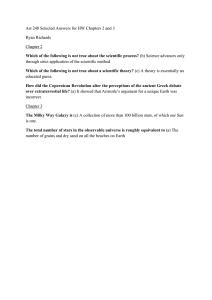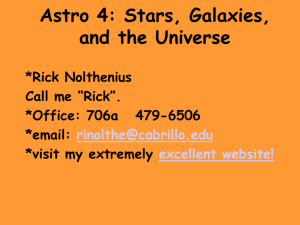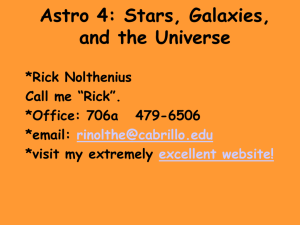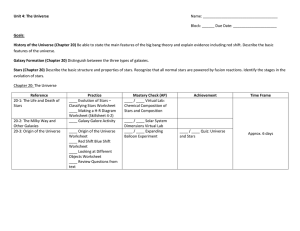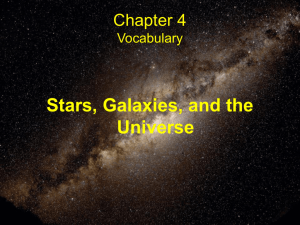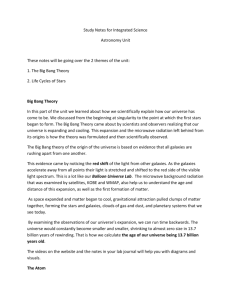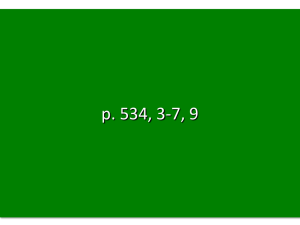News Constellation Quiz lab begins on Monday
advertisement
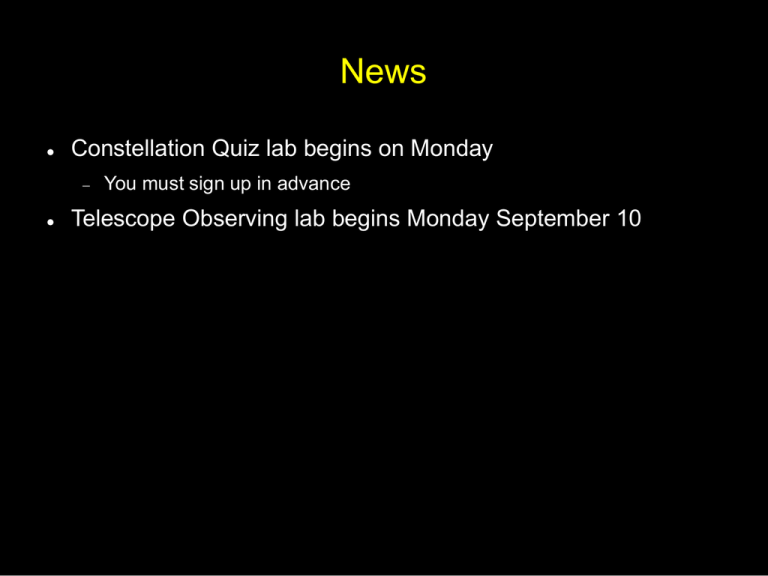
News Constellation Quiz lab begins on Monday You must sign up in advance Telescope Observing lab begins Monday September 10 Questions from Last Time? How Do You Make Sense of it All? Astronomy: A Search for Organization? Stars.... Galaxies.... Astronomy: A Search for Structure? Astronomy: A Search for Structure? Our Galaxy (the Milky Way) in Perspective: How do we fit in? Galaxies, collections of billions of stars assembled and bound by gravity, are a primary unit of Universal structure. Our Galaxy (the Milky Way) in Perspective: How do we fit in? Any random deep view of the night sky shows a universe peppered with galaxies – each containing hundreds of billions of stars. Us? Our Galaxy (the Milky Way) in Perspective: How do we fit in? A distant galaxy similar to our Milky Way The Stars Near Our Sun Associated WWW Link Our Galaxy (the Milky Way) in Perspective: How do we fit in? The Sun is embedded in the Milky Way (far from the center). We have a myopic perspective. The Milky Way is thin and flat, yet we see a lumpy diffuse band across the sky because of our proximity. Our Galaxy (the Milky Way) in Perspective: How do we fit in? Part of our perspective problem is that dust between the stars obscures our view. Our Galaxy (the Milky Way) in Perspective: How do we fit in? Infrared light penetrates dust better than visible light. An infrared view of the Milky Way reveals the real Galaxy. Astronomy: A Search for Structure? Hierarchical structure in the Universe leads to an extended mailing address..... Earth The Solar System (in capital letters) The Milky Way Galaxy The Local Group The Local Supercluster The Universe Implicit in understanding this structure is knowing how far away things actually are.... not an easy task! Understanding Structure: Divining Depth Understanding Structure: Divining Depth Understanding Structure: Divining Depth Understanding Structure: Divining Depth Still, we are focusing of phenomenology.... Astronomy: A Search for Origins!!! Where did all the structure and organization come from? How did it emerge over time? What physics/physical processes were important? We wish to explain, not just observe. Astronomy: A Search for Origins!!! Where did all the structure and organization come from? How did it emerge over time? What physics/physical processes were important? Hydrogen + Helium + Gravity Stars, Galaxies, and Humans given about 14 billion years. A Five-Minute History of the Universe The “Big Bang” brings matter, space and time into existence. It happened 13.7 billion years ago. Stars “process” Hydrogen and Helium into heavier elements like Iron, Calcium, and Oxygen. After 9 billion years of cosmic recycling (4.6 billion years ago) our Sun forms from the “ashes” for previous generations of stars. The early Universe contained only uniformly distributed Hydrogen and Helium. Almost immediately gravity begins to form stars and galaxies. a number now known to better than 1 percent! At the same time system of planets form from debris left in orbit around the Sun. Life originates quickly on Earth. but only becomes “complex” ½ billion years ago. A Five-Minute History of the Universe The “Big Bang” brings matter, space and time into existence. It happened 13.7 billion years ago. Stars “process” Hydrogen and Helium into heavier elements like Iron, Calcium, and Oxygen. After 9 billion years of cosmic recycling (4.6 billion years ago) our Sun forms from the “ashes” for previous generations of stars. The early Universe contained only uniformly distributed Hydrogen and Helium. Almost immediately gravity begins to form stars and galaxies. a number now known to better than 1 percent! At the same time system of planets form from debris left in orbit around the Sun. Life originates quickly on Earth. but only becomes “complex” ½ billion years ago. A Five-Minute History of the Universe The “Big Bang” brings matter, space and time into existence. It happened 13.7 billion years ago. Stars “process” Hydrogen and Helium into heavier elements like Iron, Calcium, and Oxygen. After 9 billion years of cosmic recycling (4.6 billion years ago) our Sun forms from the “ashes” of previous generations of stars. The early Universe contained only uniformly distributed Hydrogen and Helium. Almost immediately gravity begins to form stars and galaxies. a number now known to better than 1 percent! At the same time a system of planets form from debris left in orbit around the Sun. Life originates quickly on Earth. but only becomes “complex” ½ billion years ago. A Five-Minute History of the Universe The “Big Bang” brings matter, space and time into existence. It happened 13.7 billion years ago. Stars “process” Hydrogen and Helium into heavier elements like Iron, Calcium, and Oxygen. After 9 billion years of cosmic recycling (4.6 billion years ago) our Sun forms from the “ashes” for previous generations of stars. The early Universe contained only uniformly distributed Hydrogen and Helium. Almost immediately gravity begins to form stars and galaxies. a number now known to better than 1 percent! At the same time system of planets form from debris left in orbit around the Sun. Life originates quickly on Earth. but only becomes “complex” ½ billion years ago. A Five-Minute History of the Universe The “Big Bang” brings matter, space and time into existence. It happened 13.7 billion years ago. Stars “process” Hydrogen and Helium into heavier elements like Iron, Calcium, and Oxygen. After 9 billion years of cosmic recycling (4.6 billion years ago) our Sun forms from the “ashes” for previous generations of stars. The early Universe contained only uniformly distributed Hydrogen and Helium. Almost immediately gravity begins to form stars and galaxies. a number now known to better than 1 percent! At the same time system of planets form from debris left in orbit around the Sun. Life originates quickly on Earth. but only becomes “complex” ½ billion years ago. A Five-Minute History of the Universe If this history could be compressed into a single year: The Universe starts on January 1... The Solar System forms in early-September A Five-Minute History of the Universe If this history could be compressed into a single year: The Universe starts on January 1... The Solar System forms in early-September Life originates in mid-September Life becomes complex in mid-December A Five-Minute History of the Universe If this history could be compressed into a single year: The Universe starts on January 1... The Solar System forms in early-September Life originates in mid-September Life becomes complex in mid-December Dinosaurs roamed the Earth for two weeks between December 10 and December 25 A Five-Minute History of the Universe If this history could be compressed into a single year: The Universe starts on January 1... The Solar System forms in early-September Life originates in mid-September Life becomes complex in early-December Dinosaurs roamed the Earth for two weeks between December 10 and December 25 Humanity (intelligence?) arose at 10 p.m. on December 31 Recorded history began around 11:59:45 on December 31
